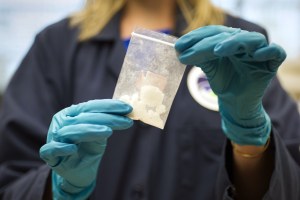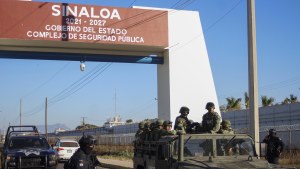From China to Mexico: Tracing the Deadly Fentanyl Trail
 Play Podcast
Play Podcast
About the Episode
With 110,000 drug overdose deaths last year, including 70 percent from synthetic opioids, we examine how international factors have played a crucial role in the US drug epidemic. Vanda Felbab-Brown of Brookings Institution and Regina LaBelle of Georgetown University offer insights on the government's response, effective policy solutions, and the path to recovery.
-
Why America is Struggling to Stop the Fentanyl Epidemic, Vanda Felbab-Brown, Foreign Affairs, May 15, 2023
-
3 Actionable Bipartisan Solutions to Address the Overdose Crisis, Regina LaBelle, The Hill, February 02, 2023
[Brian Hanson: INTRO: This is Deep Dish on Global Affairs— going beyond the headlines on critical global issues. I’m your host, Brian Hanson, with the Chicago Council on Global Affairs.
For International Overdose Awareness Day, we are looking into the worst drug epidemic in US history—the fentanyl crisis. Last year, 110,000 Americans died from drug overdoses, and fentanyl was responsible for nearly 70 percent of those deaths. While this epidemic is having devasting impacts on the US, it is a serious foreign policy issue. Pretty much all illicit fentanyl is produced beyond American borders. Typically it begins with precursor chemicals made in China that are sold to Mexican cartels who use those ingredients to make the drug, and finally, trafficking the finished product into the US for distribution.
So, why is the fentanyl epidemic so much worse than those created by other illicit drugs like heroin or cocaine? What is the US doing to disrupt the international flow of fentanyl into the country, and what more can be done?
Here with me to unpack these questions is... Vanda Felbab Brown who is a Senior Fellow at the Brookings Institution and Director for the Initiative on Nonstate Armed Actors. She is the author of a recent article in Foreign Affairs titled, “Why America is Struggling to Stop the Fentanyl Epidemic”.
Also joining us is Regina LaBelle. Regina is the Director of the Addiction and Public Policy Initiative with the O’Neill Institute at Georgetown University. Most recently, she served as Acting Director of The White House Office of National Drug Control Policy in the Biden Administration. She wrote a piece in The Hill titled, “3 actionable bipartisan solutions to address the overdose crisis”.
Regina says that while scope of this crisis and its effects are more pronounced in some areas than others, that this is really a nationwide phenomenon…]
Regina LaBelle: You mentioned the number of overdose deaths earlier over 100, 000 and, you know, obviously, since you're in Chicago, that's more than a full capacity at soldier field, but that's just 1 year and it also doesn't account for those people left behind, nor does it account for those people who don't die from an overdose who survive. I mean, I've been working on this issue since I started in the Obama administration in 2009, the numbers have been increasing every year. So
Brian Hanson: And Vanda, what would you add to that picture?
Vanda Felbab-Brown: Well, you started Brian by saying that this is the most lethal epidemic in US history. That's absolutely true. But it's also the most lethal epidemic ever in human history. And that's even before the fentanyl crisis has spread outside of North America. It's not just the US phenomenon. It's hitting very intensely Canada. It's increasingly hitting Mexico, despite what the Mexican president claims to be the case. He denies there is any fentanyl use in Mexico. It's blatantly incorrect. Fentanyl is starting to pop up in Brazil, in Europe. It is part and parcel of the global synthetic drugs revolution that is sweeping the entire world, but already just confines to North America. It is the most deadly ever in human history, and it will get deadlier.
Brian Hanson: Why is fentanyl so dangerous? We've had drugs and indeed opioids around for a long time. But fentanyl seems to be creating additional kinds of problems. Regina, is fentanyl different?
Regina LaBelle: I mean, just by its very nature. It's just a very potent, drug, you know, and, there are estimates of 30 times more potent than heroin, but I think 1 of the reasons why certainly early when we were seeing an increase in fentanyl involved, overdose deaths, and an increasing supply of fentanyl is that people didn't know what they were getting. So, I'm in Washington, D.C. and D.C. has overdose stats, involving, people who had been long term heroin users. This is a couple of years ago that we were seeing these huge increases primarily because they didn't know what they were getting. Also in the last couple of years, we've seen an increase in, young people, adolescents dying from using press pills. And again, they didn't know what they were getting at the time. So, it's more powerful and there's a lack of understanding of really what it is because it's a synthetic drug.
Vanda Felbab-Brown: If I can just a little bit emphasize what Regina had just said, I mean, potency is massively different. What really sets off synthetic opioids from any other drug, or at least any other plant based drug is the potency, which 30 times more potent than heroin is perhaps the optimistic estimate. Some estimates give it 50 or higher potency and we're not even talking about other analogs of fentanyl that are on the market. So, those things under any circumstances is very difficult. We're talking about tiny, tiny quantities that are extremely cheap to produce. From precursors that are widely available that makes dosage very difficult. And on top of that, this is a phase of the opioid epidemic that's driven by the cartels. And here it's what Regina was saying that users do not know, not only did they not know 2 years ago, but they frequently do not know what is it that they're taking because fentanyl is being added by, drug trafficking organizations and retailers into cocaine, into methamphetamine, into fake prescription pills that are sold by Mexican pharmacists that are brought to the United States and shipped here. So, users do not know, and even if they did know dosing properly is really, really hard.
Regina LaBelle: So, 1 of the 1st things when I started in the Biden administration in 2021 that we did was remove a ban on using federal funds for fentanyl test strips. Now, fentanyl test strips are not a panacea, right? But people have the right to know if they are individuals who are using drugs, They should know what they're getting. And so that was a pretty easy 1 to remove. And we did it in April of 2021. And since then, states across the country have allowed for fentanyl test strip distribution because that was considered a drug paraphernalia in many states. And that's been a bipartisan approach. And even the state of Texas, they also allowed for fentanyl test strips to be purchased and distributed with state funds.
Brian Hanson: Yeah, that's really interesting. I always like to hear about bipartisan approaches. Vanda, can you talk about when fentanyl shows up and starts becoming a major issue? I mean, I think the popular narrative was all about prescription opioids and over prescribing and all. Where did fentanyl come into this story and why did it emerge?
Vanda Felbab-Brown: Well, the over-prescription of legal opioids provided by pharmaceutical companies is a very important part of the story. Uh, did we not have, vast segments of population across, age generations across age, ethnic subgroups, addicted in the first place, to opioids? Wouldn't be able to reach the same amount of people that it is reaching. So, the cradle of the problem is enormously important and the fault, the guild that the evil caused by the pharmaceutical companies. It's something that just cannot be forgotten nonetheless, fentanyl is what ups, the deathliness, the lethality of having opioid use, disorder and fentanyl starts emerging in about 2012, 2013 and it's essentially shipped at that time, as a finished product from China to the United States. Now, across, the space, it first starts coming into, U.S. coast and then eventually starts spreading across the Mississippi West. And today, the entire United States is flooded with fentanyl. The Obama administration was very instrumental in getting one important element of cooperation from China, the scheduling of fentanyl type drugs. So today, we mostly do not get finished fentanyl shipped from China. It is now predominantly cooked, almost exclusively cooked by the Mexican cartels in Mexico and brought from Mexico to the United States, but it's everywhere. But I just want to add one here to the very grim picture that we have painted in the beginning, but just the newest twist in the market is the emergence and spreads of xylosine. That's a tranquilizer that is horrendous in the kind of morbidity effects that it causes necrotic tissue with very big challenges for users often leading to amputation. or death on its own, addictive on its own, but it's all the more horrendous because it is neutralizing, the capacity of overdose medication like Narcan to save lives. So we said 100 110,000 deaths The actual number of overdoses was five times higher, but Narcan saved four fifths of people who experienced overdose. If drugs like xylosine wipe out, the ability of buprenorphine, to reverse, addiction within a matter of months, we could see dramatic increases of what already is a very lethal epidemic.
Brian Hanson: Wow, it's a frightening observation. I want to move our discussion to kind of these pathways by which this drug enters in the United States. China was an original source. And then because of political action and response to U.S. pressure there were restrictions put in place that, at least, significantly reduced the amount of finished product that came in the United States. But Mexico remains the site of production today. And Vanda, you've done work in Mexico and kind of traced out these relationships? Could you talk about how it's produced and, you know, is China still part of the supply chain for there? What do we need to know about what happens in Mexico to produce this drug?
Vanda Felbab-Brown: Well, China is very much part of the supply chain. It is still the predominant source of precursor chemicals, from which They are sold to Mexican cartels by and large, the Sinaloa cartel and Cartel Jalisco de la Generacion Cook fentanyl out of it. They still have, the dominant control of the synthetists, but they often allow other criminal groups in Mexico to press, fentanyl into fake prescription pills. there is spread of the production. We are starting to see, pill pressing and perhaps even fentanyl synthesis emerging in Guatemala. As many details, to the story, I want to kind of add one very important, dimension, which is, emergence over the past three years. Of pharmacies in Mexico that are selling, very dangerous drugs or drugs that really need to be controlled. Some of which are laced with fentanyl, and these are not your, clandestine corner of illegal sale of drugs. This is not your typical taxi driver or Porter in the hotel offering to sell you cocaine. It's a long case. These are very polished break and mortar buildings. glass windows, attractive shop assistants, advertising blatantly that they will sell antibiotics, anabolic steroids, Viagra, Cialis, something they call Percodone, which is a poor attempt to hide Percocet. And all of it should be sold only with prescription. I was in June and July in Mexico for another iteration of my over the past 20 years. I would go to these pharmacies and pretend to want to buy. Don't, for example, saying I have no prescription, they would just readily selling me a bottle for 100 dollars. I never bought any, but they were perfectly willing to do it, even offering they would ship it to the United States. And then I pointed out this would need to evade U.S. controls. They were perfectly willing to say, Oh, we know, we know how to do that. But when people have actually bought some of the pills, like to investigative teams they frequently found fentanyl laced into drugs, not just percadone, but other types of drugs that were being sold in these pharmacies. And there are very many of them, in the Mayan Riviera in the top tourist areas. You find them every 50 yards or 100 yards in blatant view of authorities. Finally, today, Mexico announced they shut 23 down of them. Much more of that needs to take place.
Brian Hanson: Regina from sitting inside the government, what are the kinds of things that are important for the U.S. to do in relationship with Mexico in order to reduce the supply?
Regina LaBelle: Well, that's very difficult. That's a very difficult answer to give you because sometimes I felt like swatter on this huge, international. Issue because it really is transnational and what Vanda was talking about with, these global networks and the area that we focused quite a bit on, was obviously the synthetics trafficking use of the dark web, et cetera, but also looking at illicit finance. And that is, transnational operation that occurs. So, the Biden administration, and as well as the, Trump administration to did quite a bit of work to try to counter the illicit finance networks that give the fuel. To allow for the, counter narcotics trafficking to occur. and it really is beyond just drug trafficking. It's an expansive network where they're doing a lot of illegal activities. the issue that is the most challenging, I think, is that we've built up a system to over decades. To address traditional drug trafficking, so, cash based, elicit finance, and crops. I mean, this is not what we're dealing with. We're dealing with chemists now in smaller labs that are harder to find. And also, I think the levels of corruption have gotten even worse. and there's been a concentration in a few of the cartels as Vanda just said, so it, relies upon the United States. On FinCEN in our treasury department and as well as international cooperation to go after what fuels these counter narcotic operations.
Brian Hanson: And Vanda, to Build on that and to pick up on the cooperation part. understand that currently the Mexican government is not very cooperative, at all with the United States and even is not necessarily trying to disrupt the activities in Mexico for its own law enforcement purposes. Could you paint a picture of kind of what is Mexico's government doing currently or not doing currently? How are they dealing with this challenge?
Vanda Felbab-Brown: Well, unfortunately, and in my view, egregiously, we find ourselves in a situation where we have neither meaningful cooperation with China, nor meaningful cooperation with our southern neighbor, a partner country, Mexico. The reasons are different in both countries. China subordinates law enforcement counter narcotic cooperation to its geostrategic, calculations. And it finds out itself, in the moment of greatest geostrategic tension, with the United States in decades, and consequently has really withdrawn from, meaningful cooperation, which was never great, but the cooperation from China was always very, very limited, but China pulled back, even more. There are recent approaches, recent efforts by the administration to see if a little bit something can get going, but the baseline is very low. It's a different story, but no less dire with Mexico, where, during, the, uh, George W. Bush and Obama administration, we had extensive cooperation with Mexico under the MERIDA initiative. That came with a whole host of problems, blowback and backfire in Mexico. But by the time the administration of Andres Manuel Lopez Obrador came to power in December 2018, The Biden administration negotiated a new cooperative bicentennial framework with Mexico because Mexico wanted to withdraw out of Merida. But although on paper, it says a lot of good things in practice. The Mexican government is still not cooperating. So, the fact that they took down these 23 pharmacies, it's important. This is an important step, hardly adequate. There are many more of the pharmacies, hardly sufficient, but at least they've been a little bit responsive. Now, why are we finding ourselves in this moment? One is again the blowback in Mexico from Merida, the violence that it unleashed there. but more fundamentally, the Merida initiative really began revealing the extent of the rot and corruption in Mexico, the infiltration of the criminal groups into the highest levels of government and all levels of government, so domestically, the Lopez Obrador administration has really pulled back from confronting the cartels in any meaningful way. Every so often when they want to pacify pressure from the US, they will act on some of our intelligence but across the board, there has just been pullback. And so today in Mexico, the criminal groups are eating Mexico alive while the Mexican government stands by and lets it happen.
Regina LaBelle: I wanted to add something to what Vanda just said about the Bicentennial Agreement, 1 of the ongoing issues that we faced with, Mexico and with other countries is that we weren't doing enough about demand. And so I remember having this conversation saying, we can actually say list out all the things we're doing about demand. we agreed to exchange information about data collection treatment, et cetera. So that was in it and then we're still not getting the cooperation. and then the 2nd piece was, well, you need to do more. You know, about guns going south, and then we'll handle drugs going north and we have a lawsuit by the Mexican government against some of our gun manufacturers in the United States. So, I think that what's happening repeatedly in terms of the bilateral discussions is okay, you do this for us and we'll really crack down. Oh, well, that's not really what we meant. And then we wait a couple more years. And there's another demands that we need to do.
Vanda Felbab-Brown: This is that, you know, with the Biden administration, our foreign counterpart, our neighbor partner, Mexico actually gets an administration that thanks to people like Regina really invested in, expanding treatment measures, expanding demand measures, the language of harm reduction, which was never as a part of the US official government vocabulary. There was a really serious attempt. To both do much more at home as was necessary, and it's absolutely appropriate, but also cooperate with Mexico on it. And instead, we find the Mexican government Denies there is any fentanyl use in Mexico and kind of moves into the kind of rigid, often caricatured position that is often blamed on the United States. So not only the Mexican government protecting its people from the violence and oppression of the criminal groups, it is also not protecting them in the public health domain.
Brian Hanson: So, this is, really a disturbing picture, right? But not unique in this area. are there concrete steps that can be done to move us forward or is the reality that with the political situation and calculus on both sides of the border right now, it's about what it can be. What's the reality here?
Regina LaBelle: We've developed this lack of a system, lack of an approach to addiction in the United States, drug use in the United States, it's been, I believe that in, so it was 2017 when the federal government, had it Appropriate the Congress appropriated a billion dollars to close the treatment gap. That was the most money that had ever been appropriated.
Brian Hanson: So, this treatment gap is the availability of treatment to people who are addicted to, drugs to be able to seek treatment.
Regina LaBelle: Right, so about 13% of people who have a substance use disorder access treatment, and that's an even lower number who get evidence based treatment. So, it's going to take a while. And I know that that's frustrating. It's so frustrating from a policy standpoint, but we didn't get here overnight and it's going to take a while. And so, we need to build up. prevention programs that address adverse childhood experiences that may lead to substance use, get access to treatment. Recovery support systems, harm reduction, and this is the 1st administration that use that term. I mean, when I was served previously, we weren't allowed to say it and I was acting director and said, you know what? We're going to use this term because if only 13% of people are getting treatment, what do you do about that the rest of the people, you just wait till they come and raise their hand and say, I want to get help. You can't do that. So, from a domestic side, we have to build out this system on the international side. I really believe we can't. And when we have a rule of law, we have to enforce, we have to work with our counterparts, and leadership, changes in other countries. And so, we have an opportunity to build on partnerships, it's not great now, obviously, but we have to keep in mind that it's important to continue to have productive dialogues, over time that can lead to positive responses, but it's not going to happen overnight because we didn't get into this problem overnight.
Brian Hanson: Vanda, what would you add to that?
Vanda Felbab-Brown: Yeah, let me focus on the supply side. So, I think there are steps that we can take, both, with respect to our partners and that we can take internally. I think it's really time to get much tougher with Mexico. And that does imply, or I do not embrace, I do not support the idea of using military force in Mexico, both because of the diplomatic repercussions. We are not going to invade our southern neighbor partner country whose families are connected, but also because it wouldn't get us very far away. Most of the fentanyl labs are in cities, we will take out one another one will be recreated. what we need to get, is a systematic willingness of the Mexican government to, take on the criminal groups that are destroying Mexico, as well as deeply, hurting the United States. But the Mexican government has been taught, since the Trump administration that, it can, get away with anything as long as it controls the spigot of migration. The Mexican government has no interest in effectively stopping migration because that would eliminate its leverage, but the ability to let flows go or turn them down in response to US pressure, hosting people whose asylum cases are being in the United States, and the disproportionate focus on migration in our political discourse gets the Mexican government tremendous leverage. We're not going to solve the migration crisis. Unfortunately, the politics in Congress are also that we are not going to have anytime soon a systematic immigration reform that would be of tremendous help. So, what can we do? We need to break out of the leverage Mexico thinks it holds over us. Significantly beefing up inspections on the border in Mexico is 1 mechanism to do it right now. We inspect about 2% of personal vehicles and 14% of cargo. The Biden administration has put on requests and funding for scanners that would boost the inspection to about 40% of personal vehicles and 70% of cargo. That's important, but I think we should use before the scanners are deployed and after they are deployed, we should be inspecting much more. That will have significant economic consequences.
Brian Hanson: Yeah, in terms of slowing trade down, right? If we're inspecting all that, the legitimate commerce, which is ginormous,
Vanda Felbab-Brown: know,the legitimate commerce is about 600 billion a year accruing for the United States, but the cost of the fentanyl epidemic is close to 2 trillion. Yes, there will be economic pain for the United States, but there'll be greater economic pain for Mexico. With China, the Biden administration has started exploring building international coalitions to engage the Chinese government to focus on synthetic drugs. Just recently, first, summit of a global, coalition against, uh, synthetic, drug threats was held. That's a good, step. I would focus the diplomacy really specifically on Southeast Asia. Which, although it doesn't have fentanyl problems, it has meth problems that are, essentially, perpetrated, by Chinese clients that control the meth trade, the methamphetamine crystal meth that's hitting countries like Vietnam, Indonesia, is once again predominantly coming from, China. But there is also a lot that needs to happen in terms of law enforcement on our side, uh, the cartels and for that matter, the triads are not just drug trafficking entities. They are polycrime entities deeply involved in all kinds crimes against nature, illegal logging, illegal and legal phishing, and yet, the Department of Defense, for example, is only allowed to collect on a very narrow segment of maritime, illicit flows specific to drugs. our Pacific Command doesn't have same authorities, mandates or funding, even though a lot of these triads and Chinese criminal networks broadly have close connections to the Chinese Communist Party and Chinese government. So, there is a lot more that we can do far better. In the United States in terms of law enforcement, intelligence collection, if we stop thinking about the cartels in this outdated framework and really think of them as, very different entities.
Brian Hanson: So that was a fabulous list of steps that could be taken. And as we bring the conversation to a close, Regina, what gives you hope? This is a very hard problem. it's not going to be resolved instantly. It needs to be worked on and continued to work on. That can be really dispiriting. what gives you hope to keep you going?
Regina LaBelle: I think that we are achieving bipartisan agreements on things like medications for opioid use disorder, that they save lives. When I first started working on this, that was not a consensus. There were people who did not believe that we should be providing people with medications for opioid use disorder, just like we do for other conditions. And so that's an area we're making strides. We still don't have enough people getting the type of evidence based care that they need. We're still not looking at, prevention in way that we should be, where we think about the social determinants of health and how they lead to addiction and the interconnection with poverty. but I am always optimistic about the possibilities and the importance of bringing people together who really, there's a lot of people who really believe strongly about this issue. And I teach at Georgetown in a master's program on addiction policy. And what gives me hope are my students, many of whom. our people with lived experience, some of whom have spent time in the criminal justice system. They're really committed to making a difference. And I know that we're holding the door open for that next generation to come behind us.
Brian Hanson: And Vanda, what gives you hope?
Vanda Felbab-Brown: Every so often you find social, activists, civil society groups, environmental activists that despite enormous risks to themselves, to their families, that they will be tortured and killed, and horrible things will happen, despite the fact they don't have meaningful backup from the government by and large, are still willing to push for a country that's ruled by a rule of law. Now they're swimming against enormous tide, you know, at times I don't know whether I am encouraged by them or enormously worried that they are actually trying to push for it. But it is our responsibility as the United States for the sake of our people, as well as for the sake of those who still have the courage to be supporting them and to be pushing on the governments of Mexico, to be pushing on the governments of China, to be engaging countries like India to move toward a rule of law.
[Brian Hanson: OUTRO: Vanda Felbab Brown of Brookings Institution and Regina LaBelle of Georgetown University -- I want to thank you so much for being on Deep Dish and helping us understand the complexity and severity of the fentanyl problem and how to think about ways to realistically address it and make progress.
And thank you for tuning in to this episode of Deep Dish!
A reminder that we want to hear more from you, our listeners. So, send us an email or, better yet, a voice memo, to deepdish@globalaffairs.org You can suggest issues you’d like us to cover, guests you’d love to hear from, or you can just let us know how you think we’re doing.
And if you are looking for more Deep Dish in your podcast diet? Tap the “follow” button in your podcast app so you get each new episode as it’s released. If you think you know someone who would like today's episode, please "share" it with them!
As a reminder, the opinions you heard belong to the people who expressed them and not the Chicago Council on Global Affairs. This episode is produced and edited by Kyra Dahring (Dare-ring) and mixed by Frank McKearn from Aphorism Productions.
Thank you for listening. I’m Brian Hanson and we’ll be back next week with another slice of Deep Dish.]






Related Content
 US Foreign Policy
US Foreign Policy
Washington should ditch the military rhetoric and refocus efforts on work with China and Mexico, Emma Sanderson argues.
 Human Rights
Human Rights
Mass arrests have reduced crime in the short-term—but at a significant cost to human rights.

